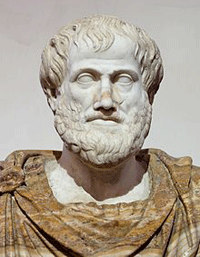|
Greek philosopher Aristotle
Answer
to Name
This Famous Person Game - June 2015
by Mike McLeod
|
 |
|
|
 If you have ever said, “The whole is greater than the sum of its parts,” or “Well begun is half done,” you were quoting the Greek philosopher Aristotle. If you have ever said, “The whole is greater than the sum of its parts,” or “Well begun is half done,” you were quoting the Greek philosopher Aristotle.
Aristotle, whose name means “the best purpose,” was born in 384 B.C. in the village of Stagira in northeastern Greece. His father and mother died when he was young so he was raised by his sister and brother-in-law in his early years.
Born into an aristocratic family, Aristotle was educated and then sent to Athens for further study at the feet of Plato. Under his tutelage, Aristotle gained great knowledge, but he did not always agree with his teacher. One difference in their philosophies was that Plato (and his teacher Socrates) believed in learning through idealism and thought (because perception can be deceptive) while Aristotle believed in learning through direct observation and experience. Consequently, Aristotle made many scientific observations and is considered one of the earliest scientists, if not the first. Records of his observations and scientific writings were rediscovered in the Middle Ages and were so monumental that they became gospel for the scientists of that day. Even Aristotle’s incorrect postulates were accepted as fact, such as his belief that the earth was the center of the universe.
“There is no great genius without a mixture of madness.”
Despite making errors as all scientists do, Aristotle discovered much scientific truth. He correctly identified the cycle of water from evaporation to condensation to precipitation. He is the first known person to create taxonomy for animals, classifying them as either bloodless (invertebrates) or blooded (vertebrates) and then defining five categories for each. Those with blood were: quadrupeds that give live birth; quadrupeds that lay legs; birds; fish; and whales. Among the bloodless he identified: insects (and incorrectly included arachnids); crustaceans (lobsters, crab, shrimp, etc.); creatures with shells; and plant-animals (anemones, coral, etc.)1 Aristotle’s depth of knowledge, breadth of observation and keen deductive reasoning in the fields of zoology, meteorology, earth sciences, philosophy, mathematics, astronomy, ethics, political science are astounding.
Aristotle left Athens after the death of Plato. He traveled, studied and made many of his zoological and other observations during that time. A few years later, Phillip of Macedonia hired Aristotle to tutor his son Alexander (the Great) in Macedonia, north of Greece.
After the assassination of Phillip by a bodyguard in 336 B.C., Alexander assumed command and was forced to put down many revolts in the lands his father conquered, including that of the independent city-state of Athens. However, Athens’ leaders changed their minds about their rebellion, perhaps after seeing Alexander’s successes against other rebels. (During his entire military career, Alexander the Great never lost a battle.)
With Athens’ allegiance resolved, Aristotle returned from Macedonia and opened his own school on the outskirts of the city, calling it the Lyceum. He taught paying pupils there and gave free classes to the public for more than a decade.
Approximately a year after the death of Alexander the Great in 323 B.C., Aristotle chose to leave Athens after being accused of impiety or heresy against the gods. This trumped-up charge was leveled against him due to his previous affiliation with the Macedonian overlord Alexander. This made him persona non grata with many Athenians.
Rather than submit to being tried for this charge, Aristotle left Athens saying, “I will not allow the Athenians to sin twice against philosophy.” This was a reference to their forcing Socrates to drink hemlock, also for a charge of heresy.2
Aristotle relocated to Euboea, an island off the coast of Greece. There, he died in 322 B.C. of a digestive ailment not long after his arrival. He was about 62 years old.
Aristotle was one of the world’s greatest thinkers, one of its earliest known scientists, an insightful philosopher and an acclaimed teacher.
“We are what we repeatedly do. Excellence, then, is not an act but a habit.”
Aristotle talked the talk and walked the walk. Or as some say today, “He walked his talk.”
Rachel Ohtani and Ginny Richards of Old School Antique Mall in Sylva, N.C., the staff at the Georgia Visitor Information Center in Lavonia, Ga., and Ted Carlton of Utah correctly identified Aristotle. Ted Carlton also correctly identified J.R.R. Tolkien last month.
-------------------------------------------
1 University of California Museum of Paleontology, “Aristotle (384-322 B.C.E),” www.ucmp.berkeley.edu; and www.animalfacts.net.
2 Basicsofphilosophy.com.
All quotes are courtesy of Brainyquotes.com.
Learn
about more Famous People
|